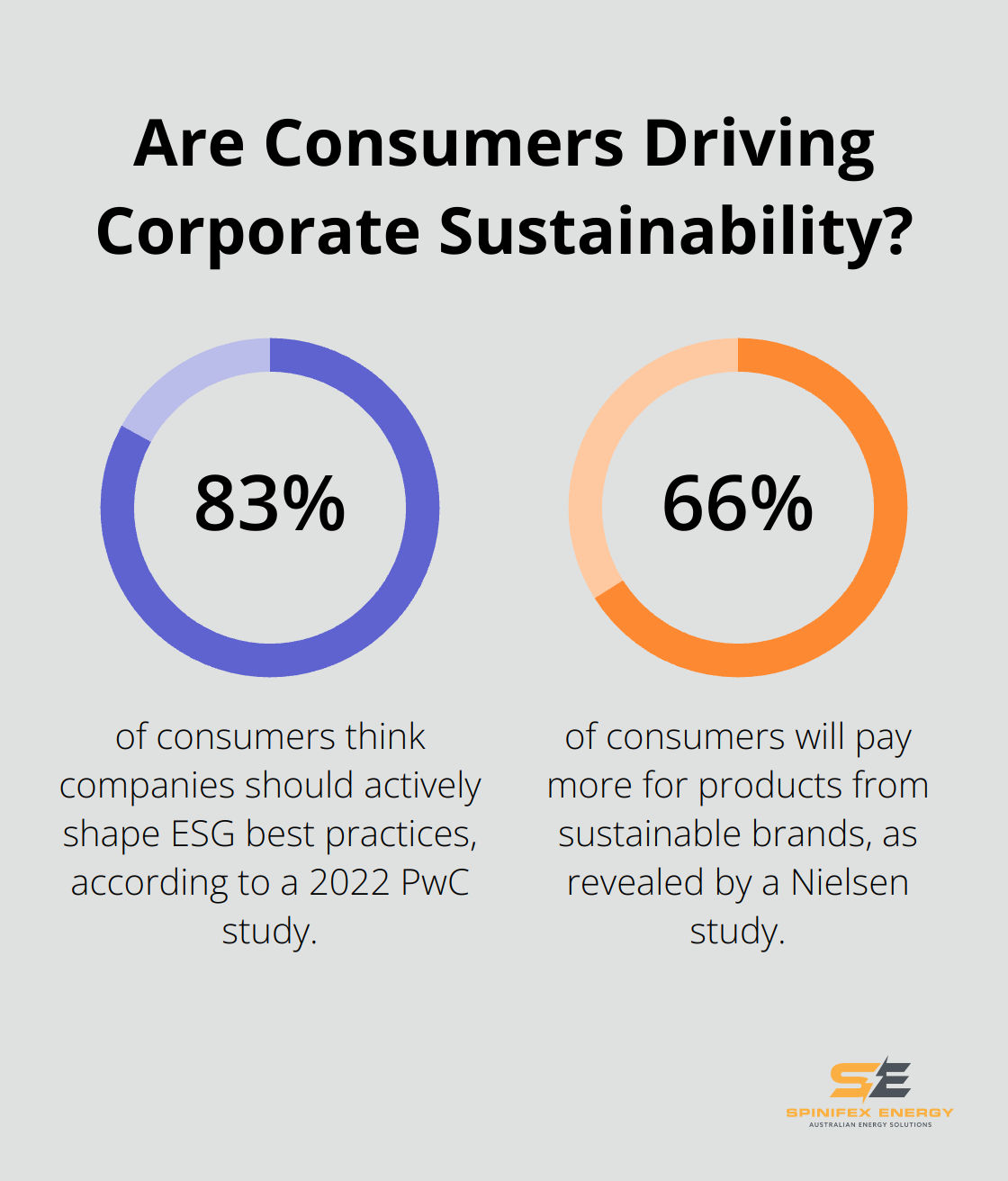Are commercial solar panels worth it? This question is on the minds of many business owners looking to reduce costs and boost sustainability.
At Spinifex Energy, we’ve seen firsthand how solar installations can transform companies’ bottom lines and environmental impact. In this post, we’ll explore the financial benefits, environmental advantages, and practical considerations of commercial solar panels.
Let’s dive into the facts and figures that show why more businesses are turning to solar power.
Understanding Commercial Solar Panels
What Are Commercial Solar Panels?
Commercial solar panels typically have a capacity ranging from 30 to 100 kW. These mid-sized installations are commonly found in medium-sized businesses, organizations, and industrial facilities.
Key Differences from Residential Systems
Commercial solar installations differ significantly from residential counterparts in several ways:
- Size: They are much larger, often covering entire rooftops or spanning across open land.
- Efficiency: They usually employ more efficient and higher-wattage panels to maximize power output in limited space.
- Complexity: Commercial systems often include more advanced monitoring and control systems to optimize performance and integrate with building energy management systems.
Types of Commercial Solar Installations
There are three main types of commercial solar installations:
- Rooftop Systems: These are the most common type, utilizing existing roof space to generate power. They’re ideal for businesses with large, flat roofs and minimal shading.
- Ground-Mounted Systems: When roof space is limited or unsuitable, ground-mounted arrays offer an alternative. These systems can scale to meet larger energy demands and are often used in solar farms or large industrial sites.
- Carport Systems: These innovative installations serve a dual purpose by generating electricity while providing covered parking for employees and customers.
Factors to Consider When Choosing a System
Selecting the appropriate system depends on various factors, including:
- Available space (roof area, land, or parking lots)
- Energy consumption patterns
- Budget constraints
- Local regulations and zoning laws
- Structural integrity of the building (for rooftop installations)
A thorough site assessment is essential before any installation takes place. This involves evaluating the roof condition, shading, and other factors to ensure businesses can maximize their energy savings and return on investment.

As we move forward, it’s important to understand the financial implications of installing commercial solar panels. The next section will explore the potential cost savings and return on investment that businesses can expect from their solar installations.
How Much Can Businesses Save with Solar?
Substantial Cost Reductions
Commercial solar panels offer significant financial benefits for businesses. Companies can slash their electricity costs by up to 100% through strategic solar installations.

The most immediate benefit of commercial solar is the dramatic drop in electricity bills. Businesses can expect to see immediate savings, reduced exposure to volatile energy prices, and long-term financial returns.
In Australia, electricity prices have risen by 63% over the past decade (according to the Australian Energy Market Commission). Solar provides a hedge against future price hikes. Businesses can lock in lower electricity rates for 25 years or more – the typical lifespan of solar panels – by generating their own power.
Government Incentives Boost Savings
The Australian government offers several incentives to make commercial solar more affordable:
- The Small-scale Renewable Energy Scheme (SRES) provides upfront rebates in the form of Small-scale Technology Certificates (STCs). These can cover up to 30% of the installation costs for systems under 100kW.
- For larger systems, the Large-scale Renewable Energy Target (LRET) offers Large-scale Generation Certificates (LGCs). These are particularly valuable for businesses with high energy consumption, as they can be sold or traded for additional income.
Impressive Return on Investment
The return on investment (ROI) for commercial solar is compelling. Many businesses see payback periods of 3 to 5 years. After this point, the electricity generated is essentially free, leading to significant long-term savings.
A 100kW system can generate a substantial amount of electricity annually. The exact amount can vary based on factors such as location, system efficiency, and weather conditions.
It’s important to note that ROI can vary based on factors such as location, energy consumption patterns, and system size. A thorough energy audit determines the most cost-effective solution for each business.
Case Study: Manufacturing Company Cuts Costs
A medium-sized manufacturing company in Melbourne installed a 200kW solar system on their factory roof. In the first year, they reduced their electricity bills by 45%. The system paid for itself in just 4 years, and now provides free electricity for the remaining 21+ years of its lifespan.
This case demonstrates the potential for substantial long-term savings through commercial solar installations. As businesses continue to seek ways to reduce operational costs and increase sustainability, solar power emerges as a smart investment with both financial and environmental benefits.
The financial advantages of commercial solar are clear, but the benefits extend beyond cost savings. The next section will explore the environmental and social impact of adopting solar energy for businesses.
Beyond Savings: The Green Impact of Commercial Solar
Reducing Carbon Emissions
Commercial solar panels offer more than financial benefits. They play a key role in reducing environmental impact and enhancing a company’s reputation. Solar power significantly reduces a business’s carbon footprint. According to the Australian Clean Energy Regulator, emissions decreased by 2.9% or 4.1 million tonnes, mostly due to the increased use of renewable energy such as solar.

This reduction in emissions helps businesses meet strict environmental regulations. Many Australian states and territories have set ambitious renewable energy targets. Companies that adopt solar position themselves ahead of potential future carbon pricing or emissions trading schemes.
Improving Corporate Responsibility
Solar power implementation demonstrates a tangible commitment to sustainability. This action resonates with employees, customers, and investors who care about environmental issues.
A 2022 PwC study found that 83% of consumers think companies should actively shape ESG (Environmental, Social, and Governance) best practices. Businesses can meet these expectations and stand out in the market by visibly investing in renewable energy.
Elevating Brand Perception
Solar installations serve as visible statements of a company’s values. They constantly remind customers and the community of a business’s commitment to sustainability.
This improved perception translates into tangible benefits. A Nielsen study revealed that 66% of consumers will pay more for products from sustainable brands. For B2B companies, many large corporations now consider their suppliers’ sustainability practices in purchasing decisions.
Companies can use their solar investment in marketing materials, annual reports, and sustainability disclosures. This transparency attracts environmentally conscious customers and partners, potentially opening new market opportunities.
Attracting Talent and Investors
A commitment to sustainability through solar energy can attract top talent. Many job seekers, especially younger generations, prefer to work for environmentally responsible companies. This can give businesses a competitive edge in recruiting and retaining skilled employees.
Investors also increasingly consider a company’s environmental initiatives when making investment decisions. Solar installations demonstrate a long-term commitment to sustainability and cost reduction, which can make a business more attractive to potential investors.
Final Thoughts
Commercial solar panels prove a worthwhile investment for businesses aiming to cut costs and boost sustainability. The financial benefits include significant electricity bill reductions, government incentives, and impressive returns on investment with payback periods as short as 3 to 5 years. Solar installations also offer substantial environmental advantages, helping companies meet sustainability goals and comply with regulations while improving their brand image.

Businesses must consider their specific circumstances when exploring solar options. Factors such as available space, energy consumption patterns, and local regulations all play a role in determining the most suitable solar solution. A thorough site assessment and energy audit will ensure the best possible outcome for your investment.
Spinifex Energy offers tailored energy consulting services to help businesses optimize their electricity expenses through advanced commercial solar power systems. We can guide you through the process of implementing a solar strategy that aligns with your business goals and budget. Are commercial solar panels worth it? For many forward-thinking companies, the answer is a resounding yes.

